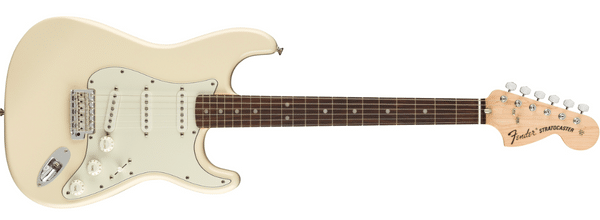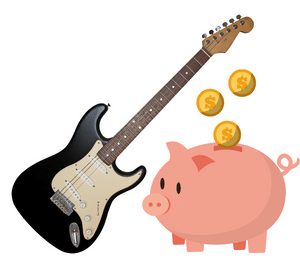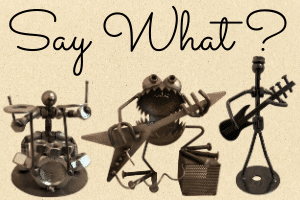Deciding when to buy your second guitar can be exciting and daunting! The answer is that the decision depends on many factors, such as what type of music you play, how long you’ve been playing, and your budget.
Keep on reading, and I’ll explain everything you need to know!
You can use the table of contents below to take you to the area that interests you. Click on the little box to open it, and then click on the section of the article you want to read, or you can read from start to finish if you want the full learning experience!
The Short Answer
You should think about buying your second guitar after playing for at least six to twelve months. A new guitar is not a substitute for practicing routinely to improve your skill level. Expect to pay at least $300 to $500 for a second guitar and choose one within your budget that will help you expand your musical repertoire.
Keep On Reading (Below) To Learn More
The Story Of My Second Guitar

I remember when I bought my second guitar like it was yesterday, even though it was in the early 1970s! My first guitar was a Sears Silvertone Jazz master copy, made by Dan Electro. The 10 Watt Silvertone amp I bought along with it wasn’t very loud, so I eventually upgraded it to a used Fender Band Master.
All the while, I was saving my money to get an Olympic white Stratocaster, like the one I saw Jimi Hendrix playing in a Guitar Player magazine! Back then, it was considered a custom color and had to be special-ordered from Fender.
Joe, the music store owner, tried to convince me to buy the mid-60s sunburst Strat he had hanging on the wall instead, but I already had my mind made up!
Luckily, he agreed to let me pay him a little each week, and I got the guitar about six weeks later.
Of course, now I realize that if I had purchased that sunburst Strat, it would have been worth a lot more money today than the early 70s guitar!
Looking back, somehow, I thought that guitar would let me play like Jimi Hendrix! Hahaha – how naive I was, but I had a ball playing that guitar and still do! The moral of this little story is to “look before you leap!”
Things To Consider Before Buying Another Guitar

Here are some things you might consider before buying a second guitar. Would one or a combination of these solve your problem and save you money in the process?
- Are you too inexperienced a guitar player to make your guitar sound good?
- Have you tried a new set of guitar strings?
- Does your guitar need to be adjusted (set up) to stay in tune and play correctly?
- Would changing the guitar’s pickups solve your problem?
- Could the problem be with your amplifier?
- Would effects pedals give you the sound you are looking for?
Keep On Reading (Below) To Learn More About Each Topic
Why Do You Want A Second Guitar?
So, what is driving you to buy another guitar? Here are some of the reasons people take the plunge.
Your First Guitar Isn’t Good enough
If your first guitar is on the cheap side, like mine was, it may not sound or play the way you want it to. Sometimes it’s not a bad idea to trade in the guitar you have for another one, especially if your guitar won’t stay in tune. Playing an out-of-tune instrument is one of the worst things you can do!
Before you do, try a different set of guitar strings. If your guitar is going out of tune, a new string set might solve the problem, or maybe the guitar intonation or action (string height) needs to be adjusted with a set up by a certified guitar tech.
Sometimes, the guitar’s pickups are not suitable for how you play or the type of music you like. For example, Single-coil pickups might not have enough signal output to drive your amp and give you more overdrive and sustain. It might be cheaper to upgrade one or more of your pickups to a double-coil (humbucker) design.
If your guitar has humbucking pickups and you want a single-coil sound that is brighter and more focused, it’s probably not worthwhile or cost-effective to make that modification.
If you are a serious guitar player, there will probably come a time when you need something better.
See 20 Guitar Tips For Beginners That You Must Know! for more info.
Expanding Your Musical Repertoire
Eventually, you may move into playing other musical genres and need to add a second instrument to make it work. For example, maybe you’re an electric player but want to get an acoustic guitar to mellow out your set list, or you play folk ballads on an acoustic guitar but want to rock out on a Strat.
Maybe your electric guitar is limiting your ability to play other musical styles. For example, buying a 7-string guitar will give your a thicker bottom end and allow you to detune to get realistic metal sounds.
You Love The Style Or Color Of Another Guitar
Maybe you see a guitar in a store or online and fall in love with that body style or color! It’s the one you’ve been looking for, and you gotta have it! I hear you, and I can’t tell you how many times that’s happened to me. When it comes to guitars, I’ve always been a sucker for an impulse buy! Sometimes it’s better to sleep on it and decide the next day or wait for it to go on sale.
You Need A Backup Guitar
Carrying a spare guitar as a backup is a good idea if you’re a gigging player. For example, if you break a string during a set, it’s much quicker and easier to change guitars than to change strings. I’ve been caught in this situation with only one guitar, and, believe me; it’s no fun!
Are You Ready For Another Guitar?
This is a big consideration that inpatient beginning players often overlook. I have to say that I was one of them! Most of the “starter” guitars will take you a pretty long time to outgrow, and some players keep that first guitar their entire life.
My uncle loved country music. He bought a cheap Kay electric guitar and amp in a discount store down the street after seeing Buck Owens on the TV show “Hee Haw.” In a year or two, he learned to play, sing and yodel. He used that guitar to entertain his family and friends and never parted with it or bought another one.
How Long Have You Been Playing?
I ask this because the first thing you’ll probably conclude after playing for a couple of months is that your low-end guitar is holding you back. If that’s the case, join the club, because I thought that too, but it’s probably not so!
Most likely, you need to practice longer. If you are getting discouraged with your playing, you might be better off spending the money on some guitar lessons.
I recommend you practice daily and wait at least six months before deciding you need a better guitar, but one year would be better.
So, a Better Guitar Won’t Necessarily Improve Things. Remember, consistent practice changes everything! I’ve seen professional guitar players make even the cheapest guitars sound great!
Be honest with yourself. A new guitar may look cool, but is it really going to solve your problem?
It takes time and dedication to learn to become a good player.
How About Your Budget?

We all have a budget that we live by. If you have the money and you’ve been playing a while, buying a second guitar is a no-brainer. Believe me, after that; it doesn’t take long to acquire quite a collection!
A wide range of electric and acoustic guitars are available to fit any budget. These days, with all the online options, it’s easy to find a second guitar on sale and many sellers have interest-free payment programs.
Trading In Your Guitar For Another One
Most beginning players trade in their first guitar for something that looks, sounds, and plays better (not necessarily in that order).
If your budget allows and the guitar you already have is different from the one you want to get, it’s a good idea to hang on to it.
For example, if you have a Strat and you’re looking to buy a Les Paul, these two guitars look, sound, and play very differently. The Start has the trebly and more focused sound of single-coil pickups, while the Les Paul’s humbuckers provide a warmer and higher output tone.
A Steady Gig Can Make All The Difference!
Once you get your first steady-paying gig, it becomes easier to justify the cost of a second guitar. It’s also a good time to get a second guitar as a backup, and it can be different from your first one to give your set list more variety.
Where Should You Buy Your Next Guitar?
It’s always a good idea to start at your local music store. This will allow you to play various types of guitars to get a better idea of what you’re really looking for.
If you can’t find what you want or get the best price, you can check out some online options like Amazon, Sam Ash, Sweetwater, Musician’s Friend, and Guitar Center.
This Amazon link has over 3,000 results for guitars. Click here to check it out!
What About Your Amplifier?
If you already have an electric guitar that plays well but doesn’t sound great, assuming it’s been properly adjusted, you should ask yourself, “could it be my amplifier?” Even a great guitar won’t sound very good through a cheesy amp!
Before buying a second electric guitar, take it into one of the local music stores and plug it into several different amps, or you can try one of your friend’s amps.
It could be that you haven’t found the amp that will give you the tone, overdrive, and sustain you’re looking for.
Can Effects Pedals Help?
Sometimes adding effects pedals to your rig will give your guitar the sound in your head. When I first started playing, I tried all types of amps to get the overdrive and distortion I craved. My single-coil guitar wouldn’t drive the amps hard enough. Even guitars with humbucker pickups weren’t up to the task.
When it occurred to me that a good distortion pedal might be the answer, a Pro Co Rat pedal solved all my problems and saved me the price of another guitar or amp.
You can check one out on Amazon by clicking here!
There are two other pedals I find helpful. A compressor pedal makes your soft notes louder and your loud notes softer, so it “levels out” the sound and gives you more sustain. A delay pedal works with your reverb to add “dimension” to whatever you play.
Second Guitar – Buyer’s Guide
If you’ve decided to go for a second guitar, here are some tips that help steer you in the right direction.
Buy Something Different
Remember, if you’re looking for a second guitar, chances are you’re either not happy with the way your guitar plays, or you want something that sounds totally different, or both.
If you already have a Strat, check out the Teles, Les Pauls, SGs, and everything else that’s available. Buying another Strat is not very likely to solve your problem. Chances are it will sound and play the same as the first one.
Plan On Spending More
If you’re looking for a higher-quality guitar, it will probably cost you more, especially if you have improved considerably as a player. Unless you’re looking for a significant design change, like going from single-coil pickups to humbuckers, spending the same amount won’t likely change your situation.
Plan on spending at least $300 To $500 on a second guitar. That will get you into the lower-middle cost range for both electric and acoustic instruments. With guitar quality, you basically get what you pay for. You can easily pay tens of thousands of dollars on a new or used vintage guitar. It’s all up to you!
You can always find it cheaper online, wait for it to go on sale, take advantage of a no-interest payment plan, buy a used instrument, or trade-in your first guitar.
Try As Many Guitars As Possible
Try before you buy! Go to as many guitar stores as it takes and try a variety of electric guitars through at least a few different amps. If you’re purchasing an acoustic guitar with a pizza-electric pickup, make sure you plug it into a good acoustic guitar amp.
Tell the salesperson the problem you’re having with your first guitar and ask for some guidance. While you’re at it, bring your old guitar and play it through a different amp to see if it improves the sound. You can also have one of the salespeople play it to see if the problem is really the guitar or if it’s you.
Inquire About The Return Policy
Find out precisely with the in-store or online return policy is for guitars! Also, inquire about a “restocking fee.” If you’re buying online, find out if you will be responsible for paying the return shipping.
You may need the time to play the guitar through your equipment to see if it solves your issue. Sometimes it can take a week or more to decide for sure!
Related Article ➡ 7.25 VS 9.5 Inch Fingerboard Radius – Which Is One Is Better?
Related Article ➡ 9.5 VS 12 Inch Fingerboard Radius – Which Is One Is Better?
Frequently Asked Questions

Here are some of the questions I get asked about buying a second guitar.
If your question does not appear here, please put it in the comments, and I will get right back to you with an answer.
Should You Own More Than One Guitar?
It’s entirely up to you, but if you play professionally, it’s always a good idea to have a backup instrument. Get one electric and one acoustic guitar if you want maximum musical versatility.
What’s The Point Of Having Multiple Guitars?
Different guitars can give you a very different sound and playing experience. The more genres of music you play, the more guitars you’re likely to have. Alternating between guitars will make your strings and frets last longer.
Some people collect expensive new and vintage guitars as an investment and never play them!
How Many Guitars Does The Average Guitarist Own?
That’s highly variable worldwide, and I don’t think there’s an accurate answer. Although Guitar World has stated that the average guitarist owns up to 7 or 8 instruments, I think this number is high. I would guess it’s more like 1 to 3 guitars.
How Long Does It Take To Get Used To A New Guitar?
That depends on the particular guitar and how often you play it. An electric guitar plays and feels very different than an acoustic instrument! Comparing similar guitars, like two electrics, they can still take a while to get used to. In general, if you are a good player, you can become completely comfortable with a new guitar in days to weeks.
Do Guitars Increase In Value With Age?
Some do, and some don’t. It depends on things like the make, model, condition, overall collectability, and individual collector appeal. The best way to know if your guitar will increase in value as it ages is to ask a guitar appraiser at a large music store or look in a guitar buyer’s guide.
How Do I Choose My Next Guitar?
Play as many different types of guitars as possible within your budget to see what works best with the music you play. It’s usually best to buy a guitar that will give your playing the most diversity. For example, if you already own a single-coil pickup guitar, like a Stratocaster, consider purchasing a double-coil instrument, like a Les Paul.
Final Thoughts

So, those are some of my thoughts and recommendations on when to buy your second guitar. I hope you found it helpful!
It’s essential to be realistic about your playing ability before investing in another guitar. I generally recommend waiting at least six to twelve months after you get your first guitar unless the instrument you currently have is so cheap or beat up that it is essentially unplayable.
If you are a beginner, consider using the money for a few guitar lessons instead. Simple things like putting on a new set of guitar strings or having your guitar set up by a certified technician may be all you require to continue playing your instrument.
Sometimes, it’s cheaper to consider a pickup upgrade. Additionally, be sure your guitar is the source of your problem. Perhaps it’s your amplifier. A cheap amp can make even a good guitar sound bad!
Think about adding an effect pedal or two. An overdrive or distortion pedal might be a way to get the sound you’re looking for!
Having a second guitar to use as a backup at a gig or to augment your musical repertoire is never a bad idea.
Plan to spend a minimum of $300 to $500 on your next guitar. If you don’t have the money to buy the guitar you really need, you’re probably better off waiting.
Try as many guitars as possible through various amplifiers before making your choice. Make sure to ask about the guitar’s return policy and return shipping costs if you buy your second guitar online. You want to have at least one to two weeks to play the instrument to be sure it’s the right one to fit your needs!
See ESP Vs Ibanez – Which Guitar Will Rock Your World? and Why Guitarists Change Guitars Between Songs – Ultimate Guide for more info.
Tell Me What You Think

Please leave a comment below if you enjoyed this article, have any questions about when to buy your second guitar, or want to give your point of view. I will be happy to help you.
- Are you thinking about a second guitar? Which one?
- What is stopping you from getting another guitar?
- After reading this article, are you in a better position to make a buying decision?
- What else is on your mind?



I greatly enjoyed reading your article!! I do not own or play any instruments, but I have had interest for many years but haven’t made the time to pursue it. My teenage daughter just joined her school band and is currently playing the flute, but has great interest in learning other instruments later on. She hasn’t directly said she has interest in a guitar, but she has asked many questions about her grandmother’s guitar so I think that intrigue will be peaked the farther she progresses with her involvement with music. 🙂 This article was very helpful for even her first purchase of a guitar when the time comes. Thank you so much for sharing your knowledge!
Hi, Nikki
Thank You for your comments!
Many of the principles in the article apply to people buying a second instrument of any sort, not only guitars.
If you have thought about playing the guitar for all that time, why not “take the plunge?” There is an abundance of good-quality guitars available at affordable prices that are more than adequate for a beginner! 😊
It sounds like you have a musically talented daughter, and it’s great that you’re further encouraging her interest!
Best,
Frank 🎸
Hi Frank,
Thank you for sharing these guidelines for buying a second guitar. Many musicians need to read it so they won’t rush to buy guitar number 2 when number 1 is still okay or just needs minor fixing.
My first guitar was a simple acoustic Yamaha intended solely for me to learn the basics. I had it with me for 5 years, changed the strings 2 or 3 times, and had my husband adjust the tuning pegs several times. This is because they easily loosen. (Overused I guess, ha ha.)
I decided I needed a second guitar after my brother accidentally dropped it and suffered a small crack. (Note: It still sounded okay.)
Yet, I have always wanted to buy a new guitar; one that’s better and can connect to an amplifier. So, I did. Thanks to my brother, lol. I’m happy I did because it motivated me to become a better musician. And since it can be connected to an amplifier and a microphone, I was also encouraged to hone my singing skills.
You’re absolutely right; a second guitar, one that costs a lot more and is better in quality won’t make one play like their favorite band artists. And that’s why it is important to consider all the important points you enumerated in this post.
Thanks again!
Hi, Alice
Thank You for your comments!
I totally agree with you. Many players rush into purchasing a second instrument for all the wrong reasons, not that I haven’t done that again and again! 😎
Sorry to learn about your first guitar. Even cracked instruments that sound ok should be considered for an appropriate repair to prevent further damage.
It sounds like you bought another acoustic guitar with a built-in piezo-electric pickup.
Congratulations!
Those are great when you’re playing in a larger room and in front of an audience!
Dedication and practice are vital to sounding like the guitar players we admire!
Frank 🎸
Asking plenty of questions is crucial, in my opinion. Players who are purchasing their second guitar are typically rather knowledgeable, but they are not experts. So, when you’re in the store, be sure to ask lots of questions. I’ve never encountered a salesperson at a guitar store who wasn’t extremely helpful and polite, so ask them questions to make sure you buy the correct instrument. Knowing the fundamental functions of guitars and guitar parts will help you understand the state of the instrument if you’re looking to buy one.
Yes, It’s definitely important to play a variety of guitars before making your purchase. Asking questions can help point you toward a second guitar that will allow you to expand your tonal and performance options.
Keep On Rocking!
Frank ?